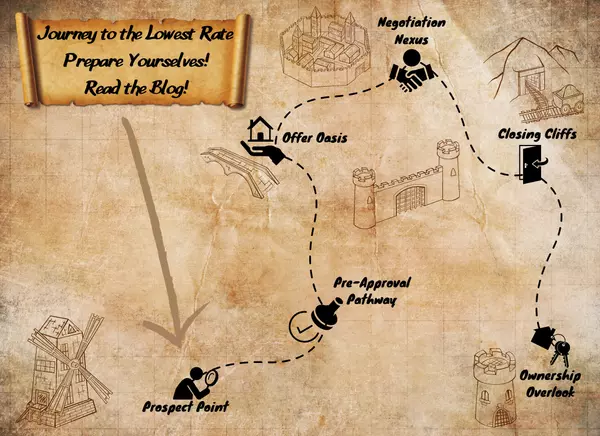Can Real Estate Agent Be a Side Job? Exploring the Possibilities

Can Real Estate Agent Be a Side Job?
In today's fast-paced world, many people are exploring side jobs to supplement their income. One intriguing option is becoming a real estate agent. But can being a real estate agent really be a side job? Let's dive into the possibilities and see if this path is right for you.
What is a Real Estate Agent?
Real estate agents are essential intermediaries in the real estate industry, guiding clients through the complexities of buying, selling, and renting properties. They understand client needs and conduct detailed market research to identify suitable properties and arrange viewings. Agents also provide valuable insights into the local market, staying updated on trends, property values, and neighborhood developments, advising clients on optimal buying or selling times.
Their expertise in negotiation is crucial as they work to secure the best deals for their clients, managing price negotiations and resolving transaction-related issues. Agents are also skilled in handling necessary legal and financial paperwork, ensuring that all documents are accurate and submitted promptly to facilitate smooth and lawful transactions.
Overall, real estate agents play a vital role by leveraging their market knowledge and negotiation skills to help clients achieve their property goals efficiently and effectively. Their ability to navigate market complexities and provide high-quality advice is indispensable in ensuring successful real estate transactions.
Can You Be a Part-Time Real Estate Agent?
- Flexible Schedule: One of the biggest perks of being a real estate agent is the flexible schedule. Agents often set their own hours, making it easier to balance another job. However, this flexibility also means you need to be available when your clients need you, which can sometimes include evenings and weekends.
- Earning Potential: The earning potential in real estate is usually commission-based, meaning you often times earn a percentage of each sale. As a part-time agent, your income might be lower than full-time agents, but with dedication and effective time management, you can still make a substantial amount. Commissions can vary greatly depending on the property and the market.
- Training and Licensing: Before you start, you need to complete pre-licensing courses and pass a state exam. This requires time and financial investment, as pre-licensing courses can take weeks to complete. Continued education is also necessary to keep up with industry changes and maintain your license. Different states have different requirements, so be sure to research your state's specific licensing process.
- Building a Client Base: Building a client base takes time and effort, especially for part-time agents. Networking and marketing yourself is crucial. You need to use every opportunity to promote your services, which can be time-consuming. Utilizing social media, real estate platforms, and word-of-mouth referrals are good methods for attracting clients and growing your business.
Benefits of Being a Part-Time Real Estate Agent
- Extra Income: A side job in real estate can provide a significant boost to your income. Commissions from just a few sales can add up quickly, making it a lucrative side hustle.
- Skill Development: Working in real estate hones various skills, including negotiation, marketing, and customer service. These skills can benefit you in your primary job as well, enhancing your overall professional profile.
- Career Transition: If you find real estate fulfilling, you might consider transitioning to it full-time in the future. Starting part-time allows you to test the waters without giving up your main source of income. Many successful agents began their careers part-time before making a full-time commitment.
Challenges of Balancing Two Jobs
- Time Management: Juggling two jobs requires excellent time management. You need to be organized and disciplined to ensure neither job suffers. Using a planner or digital calendar can help keep track of appointments and deadlines.
- Client Expectations: Clients expect prompt responses and availability. Balancing this with another job can be challenging, especially during peak times in real estate. Setting clear boundaries and managing client expectations is crucial to maintaining a healthy work-life balance.
- Burnout: Managing two jobs can lead to burnout if not handled properly. It's important to set boundaries and take care of your well-being. Regular breaks, exercise, and relaxation are essential to avoid exhaustion.
Tips for Success as a Part-Time Real Estate Agent
- Plan Your Schedule: Use a calendar to plan your week. Allocate specific times for real estate tasks and stick to them. Be realistic about how much time you can dedicate to real estate without compromising your main job.
- Leverage Technology: Use real estate apps and software to manage your workload efficiently. Virtual tours and online meetings can save time and help you serve clients remotely. Tools like CRM (Customer Relationship Management) systems can help keep track of client interactions and follow-ups.
- Build a Support Network: Connect with other real estate professionals who can offer advice and support. Mentors can be invaluable in guiding you through the complexities of the real estate market. Joining local real estate associations or groups can provide networking opportunities and resources.
- Prioritize Clients: Make sure your clients feel valued. Prompt communication and excellent service can lead to referrals and repeat business. Always follow up with clients to ensure their needs are met and to stay top-of-mind for future transactions.
- Stay Educated: Keep up with market trends and continue your education. Knowledge is power in real estate, and staying informed can give you a competitive edge. Attend workshops, webinars, and other educational events to stay updated on industry best practices.
Tools for Success as a Part-Time Real Estate Agent
- DocuSign: Simplifies the signing process with electronic signatures, making it easy to handle paperwork efficiently, even remotely. It saves time and ensures that documents are signed securely and legally.
- Canva: A user-friendly graphic design tool that helps create eye-catching marketing materials, such as social media posts, flyers, and brochures. It's great for promoting your services and listings.
- Waze: A navigation app that helps you find the fastest routes to property showings and client meetings, saving you time on the road and helping you stay punctual.
- Trello: An excellent tool for organizing tasks and managing projects. It allows you to create boards, lists, and cards to keep track of your real estate activities and deadlines.
- G Suite: A suite of productivity tools from Google, including Gmail, Calendar, Drive, and Docs. It helps you stay organized, communicate effectively with clients, and manage your documents and schedules efficiently.
- Zillow Premier Agent: Helps manage leads and communicate with clients efficiently. It connects you with potential buyers and sellers in your area and allows you to track your interactions with them.
- ListReports: Provides marketing materials and data for real estate agents. It offers property reports, neighborhood data, and customizable marketing templates to help you present listings professionally.
- Lofty Solution Suite: While there are many CRMs out there, this is the one I currently recommend. It helps manage your client relationships, track leads, and streamline your workflow to ensure you stay on top of your real estate business.
Q/A
Q: How much time should I dedicate to being a part-time real estate agent?
A: It varies, but many part-time agents spend about 10-20 hours per week on real estate activities.
Q: Is it difficult to get a real estate license?
A: It requires time and effort. You'll need to complete pre-licensing courses and pass a state exam, but with dedication, it's achievable.
Q: Can I succeed as a part-time real estate agent?
A: Yes, with proper time management, dedication, and effective marketing, many part-time agents find success.
Q: Do I need to join a real estate brokerage?
A: Yes, real estate agents must work under a licensed broker. Choose a brokerage that supports part-time agents.
Q: What are the start-up costs?
A: Initial costs include licensing fees, pre-licensing courses, association dues, and marketing expenses. These can vary by state and brokerage.
Like What You See? Let's Stay Connected!
If you're interested in the real estate market, especially in the Greater San Antonio Area, make sure to follow me on all my social media pages! Stay updated with the latest listings, market trends, and real estate tips. Sign up right here on my website to view listings and get personalized advice catered to your real estate goals.
If you're looking for a dedicated real estate agent ready to assist you from start to finish, don't hesitate to reach out. I'm here to help you find your dream home or sell your property on your timeline! I look forward to hearing from you soon!
Sources
Categories
Recent Posts













